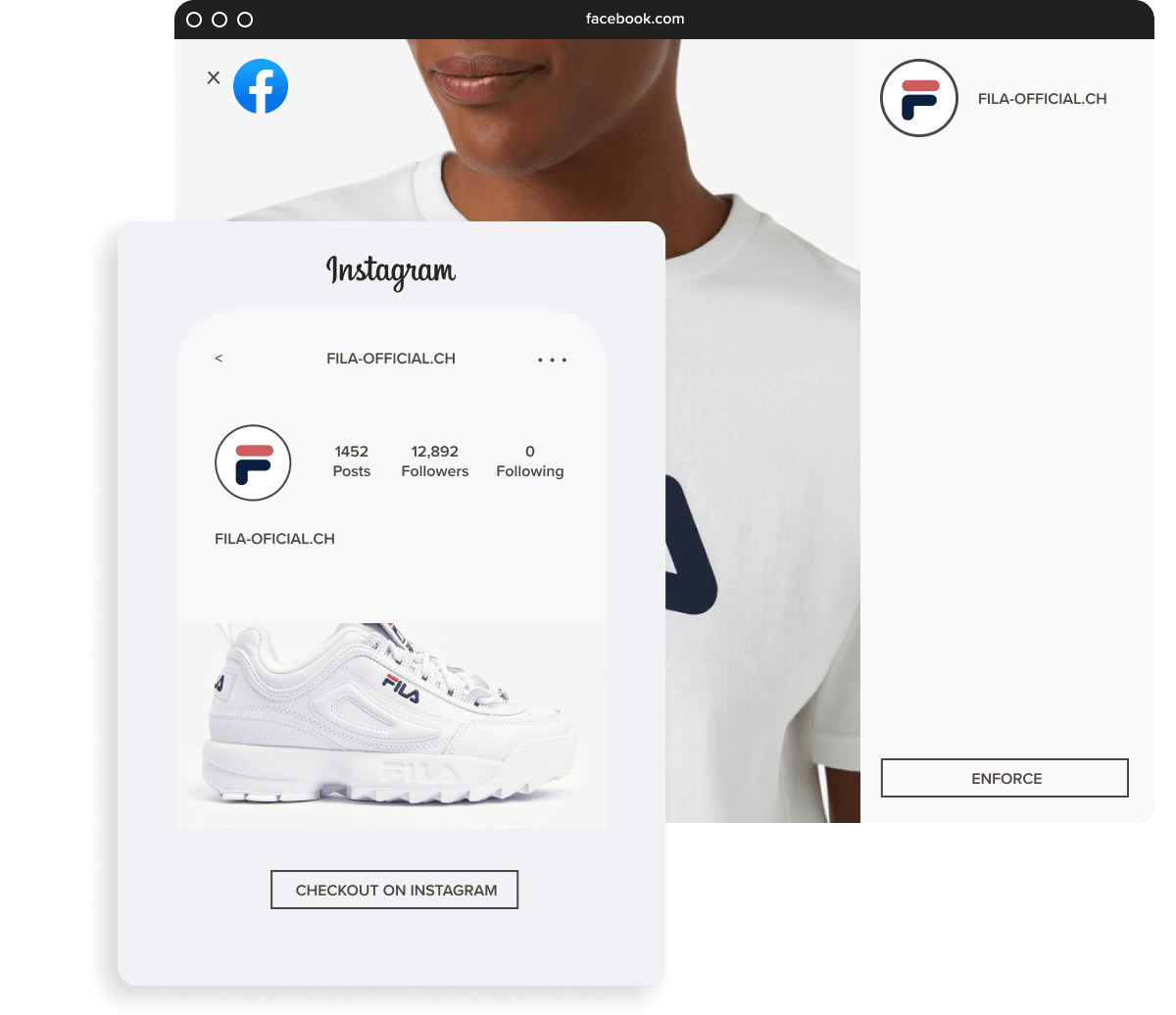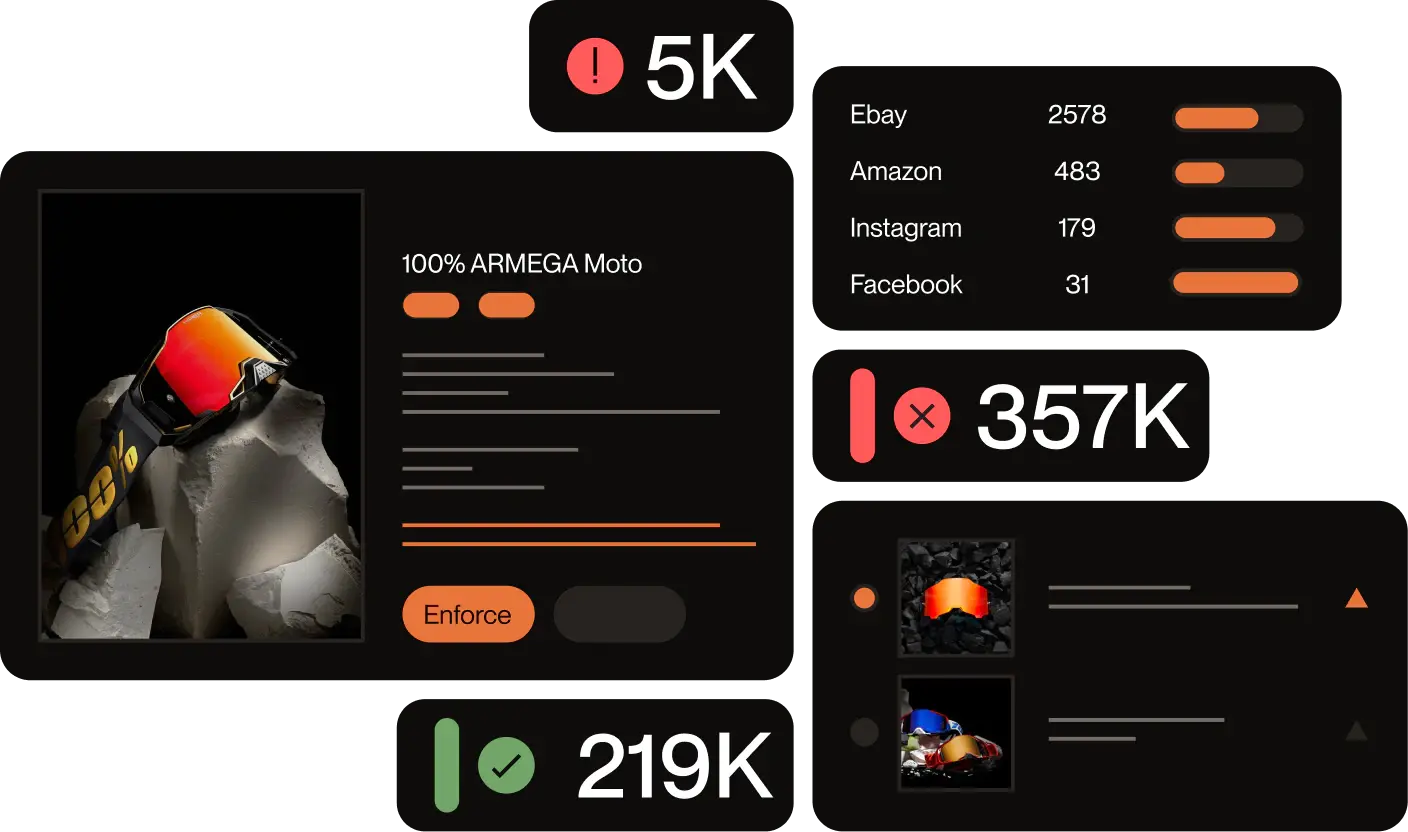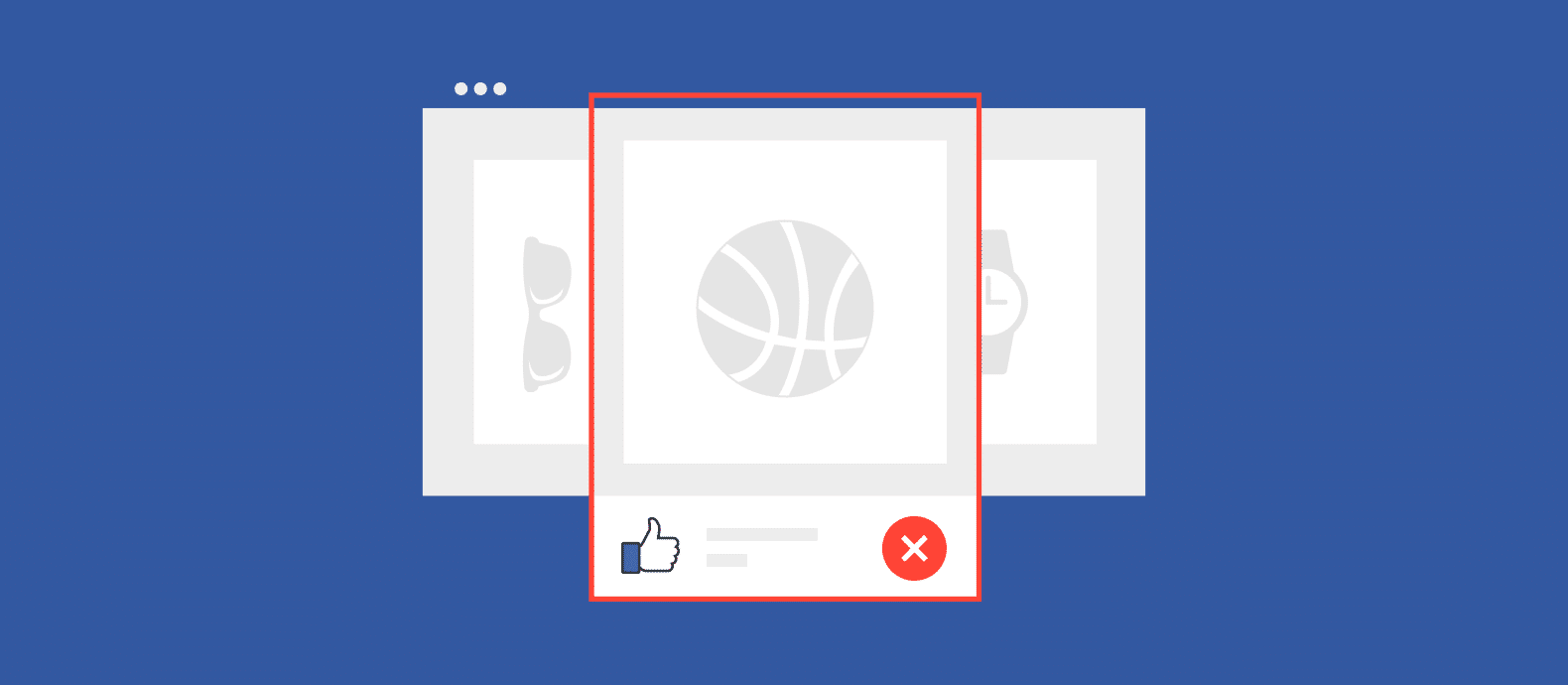Have you found ads or fake profiles on Facebook stealing your copyrighted material?
It can be incredibly frustrating, especially when the fake content drives users to counterfeit or phishing websites.
And unfortunately, copyright infringement on Facebook is getting bigger: we’ve seen a 62% increase in the last two years.
So what can you do? Thankfully, you can report a copyright infringement on Facebook with a simple form by providing your IP and details of the infringing content.
However, to stay ahead of scammers, it’s necessary to use an automated platform that can detect and enforce infringements at scale.
Read on to learn how to report a copyright infringement on Facebook and how to leverage Red Points for 24/7 enforcement.
How to report copyright infringement on Facebook
Facebook takes intellectual property rights seriously, and it makes it fairly easy to report copyright infringement. Here’s what you need to do.
Step 1: Access Facebook’s copyright infringement form
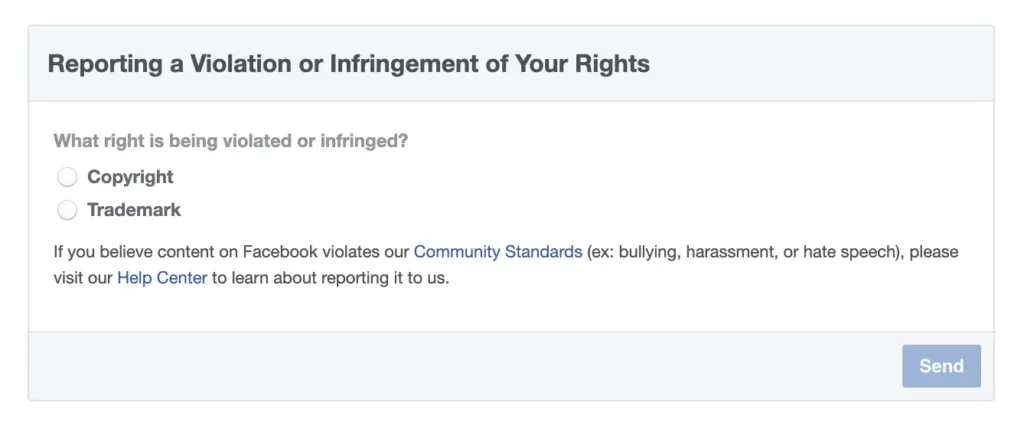
If you want to report an intellectual property infringement, start by visiting Facebook’s online copyright report form here. Select copyright infringement to begin the report.
Step 2: Fill out the form
Next, fill out Facebook’s single-page copyright infringement form. You’ll start by noting whether you own the IP or you’re an authorized representative. Then, you’ll enter your contact information.
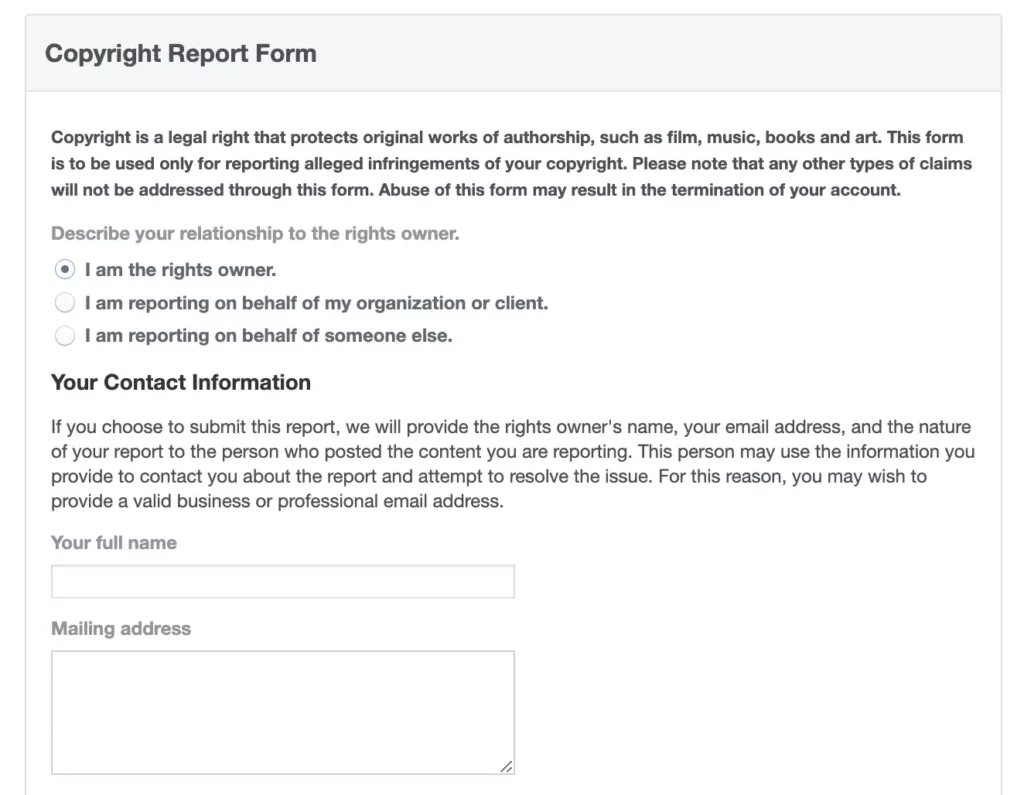
Note that Facebook won’t accept a report filed on behalf of someone else. You must be the rights owner or an authorized agent.
Next, enter your email and country, and then select whether your copyrighted work is a photo, video, or text.
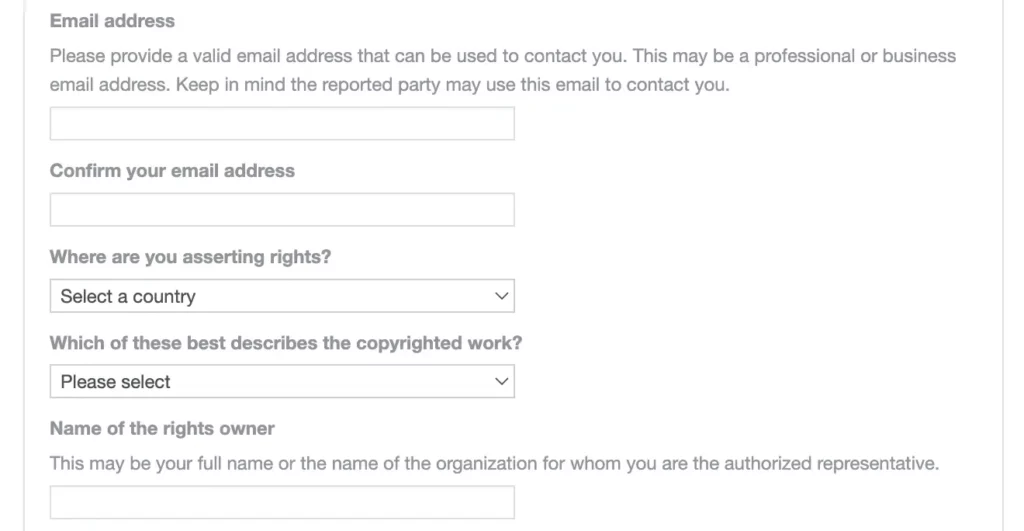
Also, note that your email will be shared with the infringing party, so you might want to use a generic business email account to report copyright infringement on Facebook.
As you scroll down, you’ll see a spot to enter URLs that show your copyrighted material. It’s important to provide accurate URLs that show good examples of your IP so Facebook’s team can understand your claim.

Now you’ll enter URLs for the infringing content. Accurate data is important because any mistakes can slow down the process or cause Facebook to reject your report. Select whether you’re reporting a photo, video, post, or ad.
You can add multiple URLs at this step. If there is no way to get a URL, you can describe the content instead, saying who posted the content and when. If you’re reporting a Facebook ad, you should provide the page that posted the ad along with a description and screenshot.
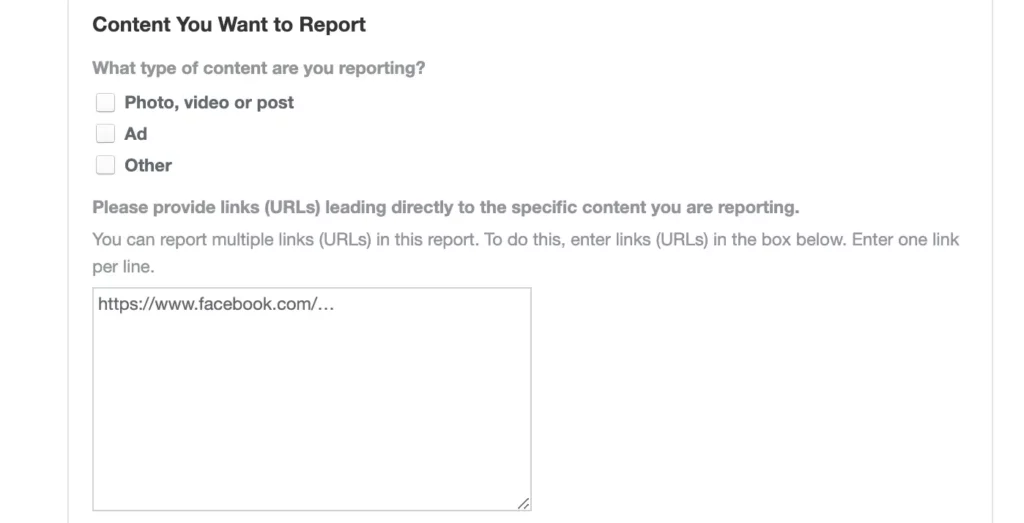
Step 3: Submit the report
Finally, choose the reason why you’re submitting a report and add additional information to support your case. In the attachments section, you can upload other documents like certificates and licenses to strengthen your claim. Then, submit the report.
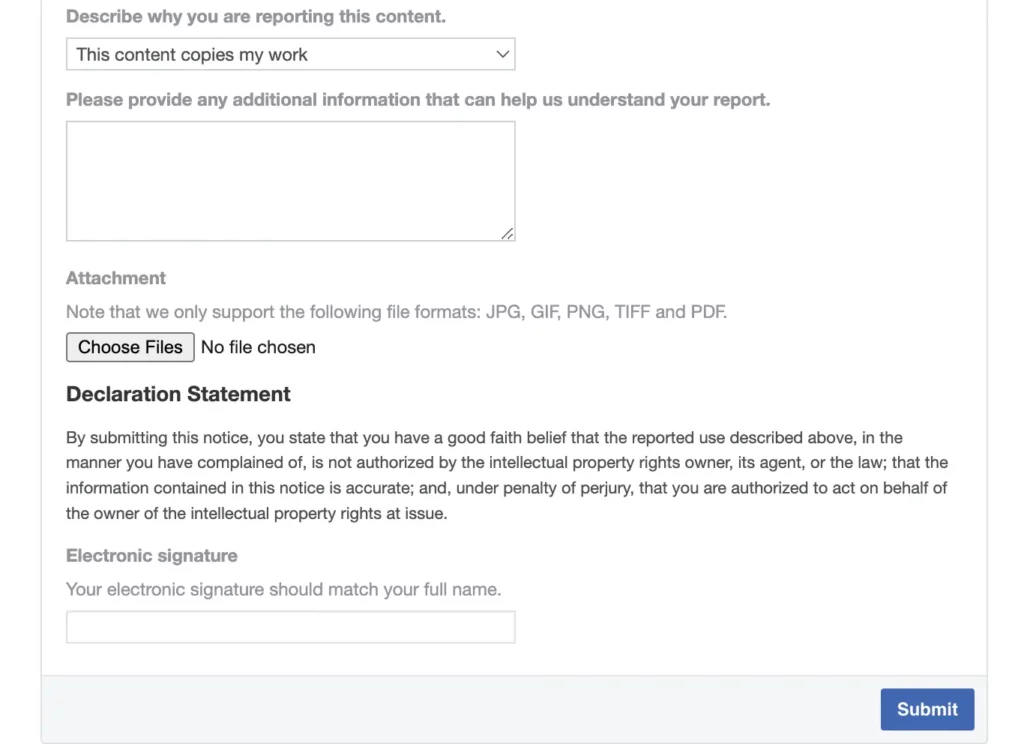
What happens after you report copyright infringement on Facebook?
After you submit a copyright report form on Facebook, it will review the case. Here’s what you can expect.
Facebook review process
Facebook uses both automated and human resources to review copyright claims, which is why accuracy matters. Providing a clear and complete report helps machines and people understand your claim.
Unfortunately, Facebook doesn’t guarantee a specific review timeline. However, our experience shows the platform handles one-off reports within a few days in most cases. It might take longer if the claim is complex.
If Facebook needs more information, you’ll get a notification or an email. Be sure to reply quickly with what they’re asking for.
Potential outcomes
There are a few different possibilities for what happens next:
- Removal: If you’ve provided good evidence, Facebook will simply remove the offending link, photo, or video from the site.
- Actions against the user: Besides removing the content, Facebook could send a warning to the offending user or disable their account altogether depending on the issue’s severity.
- Counter notice: The alleged infringer is able to submit an appeal under the United States Digital Millennium Copyright Act (DMCA) or contact you directly to submit a counter-notice. It’s not clear if the recipient has a certain number of days in which to counter.
If the receiver files a counter notice, you have 10 to 14 business days to file a court action against the alleged infringer. If you don’t respond within that timeframe with a filing, Facebook can reinstate the content you reported.
Follow-up steps
Facebook doesn’t provide a tracking dashboard with its standard copyright request form. You’ll have to wait for notifications in your account or emails to know if the report has been accepted.
That said, your brand can join Facebook’s Brand Rights Protection platform if you have a portfolio in the Meta Business Suite. You can upload your IP documents once and then create multiple copyright removal requests. You can also track the status of each request on this platform. Joining Brand Rights Protection is worth it if you’re dealing with multiple IP issues on Facebook.
If you haven’t heard anything in a week, it’s worth sending another copyright form with more evidence if you can provide it.
Alternative ways to contact Facebook about copyright issues
If snail mail is your thing, you can contact Facebook’s DMCA-designated agent at the address below:
- Meta Platforms, Inc.
- Attn: Meta Designated Agent
- 1601 Willow Road
- Menlo Park, California 94025
- 650.543.4800 (phone)
If you choose to go this route, you need to create a copyright report form on Facebook, which includes the following information:
- Your contact information (name, mailing address, and phone number)
- A description of the copyrighted work that you claim has been infringed on Facebook
- A description of the content on our site that you claim infringes your copyright
- URLs of infringing content
- A declaration that use of the copyrighted content is not authorized, you’ve provided accurate information, and you are the owner or authorized agent of the rightsholder
- Your electronic or physical signature
If you have a Meta Business Suite account, you might be able to get live chat support in certain locations. Some Redditors report finding the option on the payment settings page for an ad account or in the settings for your Facebook Shop in a commerce account. However, it can be hard to contact a human at Facebook even with Business Suite. And if you’re just using a standard Facebook account, getting support is even harder.
Can individuals legally post copyrighted content on their Facebook pages?
According to Facebook’s terms, users are only allowed to post content that doesn’t violate the IP rights of someone else. Of course, many people share photos, videos, and quotes all day long. Copyright law allows for fair use of material, which permits quotation, review, parody, and criticism. The bottom line is that Facebook allows rights holders to claim copyright infringement, and the website takes these claims seriously.
Automating copyright protection on Facebook
Protecting your IP on the largest social media platform in the world can be daunting. Even with manual reporting tools, infringements can fall through the cracks. This is where automation comes in.
An automated system can protect your IP while you sleep with 24/7 monitoring and proactive detection. The best brand protection platforms can detect trademark and copyright infringement on Facebook in posts, ads, pages, videos, and even pictures through image recognition.
Automated copyright protection scales with you, so you can prevent bad actors who want to steal your customers as your brand grows. 24/7 detection can also protect your brand across channels since Facebook infringements are often connected to standalone sites selling fake merchandise.
Red Points AI brand protection for Facebook
Red Points AI-powered brand protection platform is your strongest defense against infringers on Facebook, other social media platforms, marketplaces, and standalone websites. Our platform detects, prioritizes, and enforces takedowns on Facebook on your behalf.
Our AI models are personalized with billions of brand protection data points and overseen by experts to provide accurate enforcement. And if you come across obstinate infringers who push back, we escalate issues with Facebook’s team or legal resources.
Having worked with Facebook for many years, our close relationship enables us to expedite takedowns. It takes us an average of three days to enforce a copyright infringement claim on Facebook.
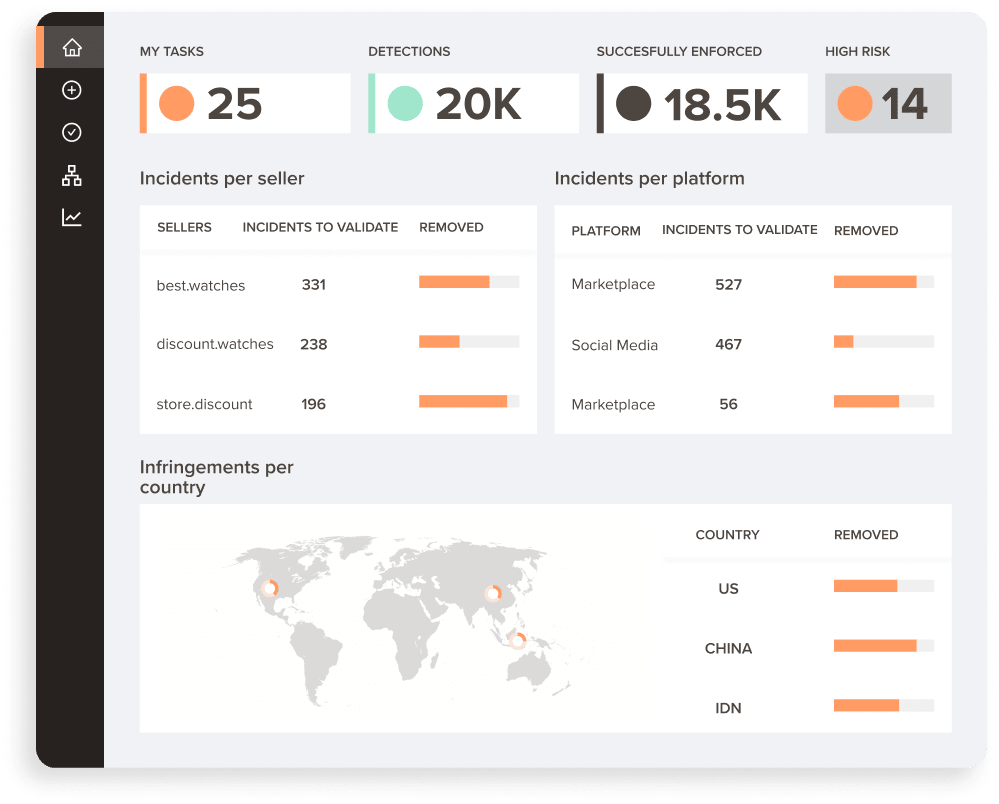
What’s next
Facebook is free for everyone to use, but that doesn’t mean bad actors get a free pass to use your copyrighted material on the platform. If you find infringements, you can get them taken down with Facebook’s copyright infringement report form. Collect your evidence and submit accurate URLs to have the best shot at getting it approved. You can also join the Brand Rights Protection platform for more control.
However, if you want to evolve past manual detection and reporting, consider a brand protection platform like Red Points. Our advanced technology includes keyword search, computer vision, and machine learning to provide comprehensive protection online. Reach out for a quick demo today to see why 1,300+ clients trust us.



